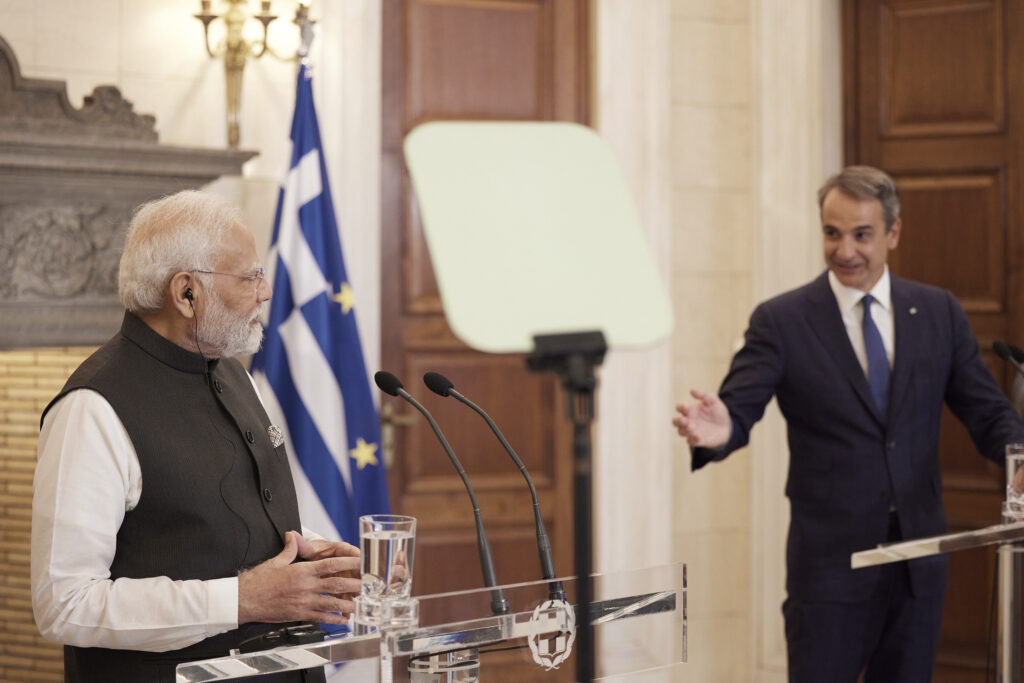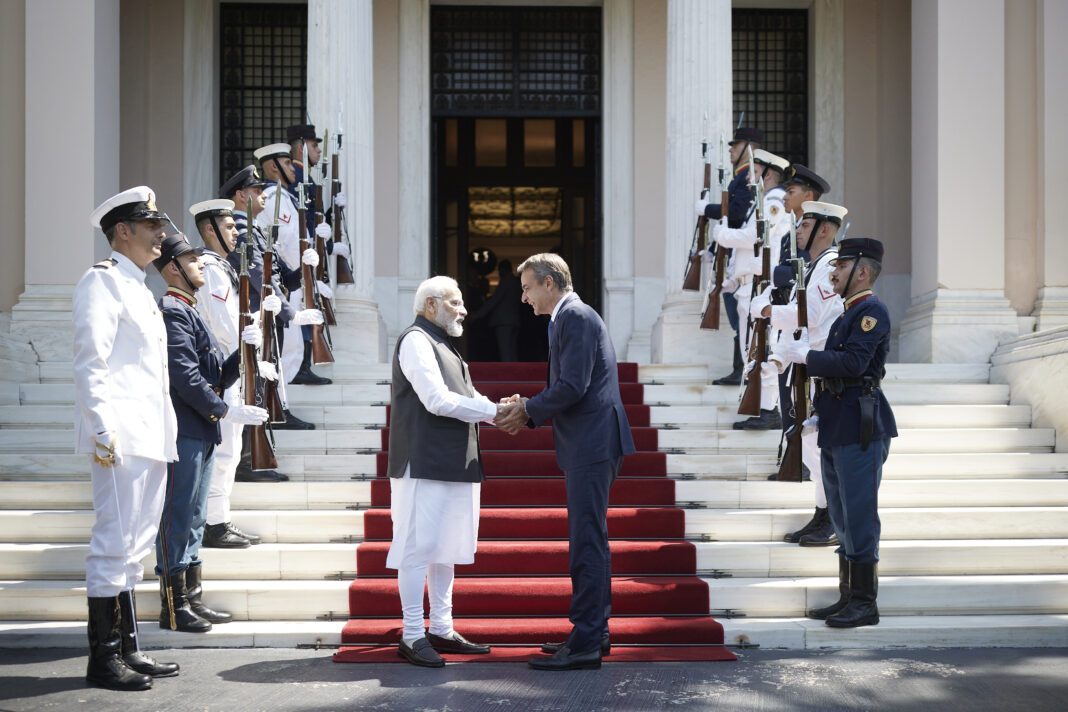By Eleni Vasiliki Bampaliouta
After 40 years the Prime Minister of India visits Greece
It is the first time, after 40 years, that an Indian Prime Minister has visited Greece and as the Indian Prime Minister Mr. Modi emphasizes, his visit to Greece “opens a new chapter in the multifactorial relationship between the two countries”.
It is a visit with strong business interest, as the Indian Prime Minister was accompanied by top businessmen of the country, who held meetings with Greek businessmen. “Cooperation in various fields, such as trade and investment, defense and cultural and people-to-people contacts, have brought our two countries closer,” Mr. Modi emphasized.
It is noted that according to the relevant information note from the side of India, the two countries enjoy cultural ties, which have been strengthened in recent years through cooperation in areas such as maritime transport, defense, trade and investment, and people-to-people ties. .
Business relations are strengthened
In recent years, the two countries have grown closer with the volume of bilateral trade set to increase by 58% in 2022 to €1.32 billion, the highest level in the last 5 years. At the same time, Greece and India have also become closer in the defense sector, with the reference point being the multinational air exercise HNIOHOS-23, led by the Greek Air Force, in which Su-30MKI fighter jets of the Indian Air Force participated for the first time. In the same mood, the Indian Navy’s warship INS Chennai recently arrived in Souda Bay, where it also conducted a transit exercise with the Greek warship Nikiforos Fokas. Apart from this, Greek fighter jets are expected to participate for the first time in the Indian exercise ‘Tarang Shakti’ in September.
At the same time, according to information from the Greek side, the discussions are expected to focus on workforce and technology issues, while the pharmaceutical sector may have a key role, as India is the largest manufacturer of generic drugs in the world, with the pharmaceutical sector covering more than 50% of global demand for vaccines.
It is worth noting that, after Brexit, India is looking for a stable ally that could be the gateway for Indian businesses to the EU. In this context, the port of Piraeus, the which could be used for the faster “importation” of Indian products to Europe.
A deeper analysis of the geopolitical game that just begins !!!
The geopolitical map of the wider region is expected to be changed in the near future by Cyprus and Greece, with Israel as the protagonist, which as the regional power drags the dance, seeking to have as co-protagonists other states that play a leading role in their neighborhood and internationally, as they are India and Saudi Arabia.
As we are informed by government sources, during the last Tripartite, held in Cyprus last week, the following was said:
First: Making final decisions by the end of the year. It has already been decided that a pipeline will pass through the Israeli fields in Cyprus. This is considered as the first leg of EastMed.
Then there are two options. The first is the EastMed pipeline to Greece and from there to Italy and the rest of Europe. The second is that of LNG in Cyprus and its transport via ships to Alexandroupolis and in other directions. This appears to be more advantageous, writes Yannos Charalambidis in his analysis.
As we are informed in this regard, the works will start as soon as the final decision is made, because everyone involved wants to seize the opportunity of the five years, as they say.

“EastMed via tanker”
One more thing is added to these developments: At the beginning of next year, it is expected that an agreement will be reached between Cyprus and Israel on the issue of percentages in part of the Aphrodite plot.
The no-pipeline option to Greece is emerging as an “EastMed via tanker”, especially at a time when Europe is in need of energy due to the Ukrainian crisis. In addition, the first green energy milestone closes by 2030, so if the project in Cyprus ends in 2026, it will have four years to be very profitable.
Then the issue depends on whether and how much the EU will limit its needs in natural gas and oil due to its transition to green energy. For Cyprus and Israel there are Asian markets outside of Europe. This project does not affect the choice of pipeline to Egypt.
Second, the creation of a geopolitical and geostrategic arc with India, Saudi Arabia, Israel, Cyprus, Greece, which reaches the EU and includes:
It covers US gaps
A) States of different ethnicities and religions, which will coexist serving common interests. B) Economic, trade and energy cooperation. C) Defense cooperation in the logic of a security subsystem, which also favors the US, without excluding the participation of Jordan and Egypt.
This design is estimated to fill gaps in the United States at the regional level and can work in parallel and in competition with the new Silk Road from China to Europe, in sea, land and even air space.
It works as a deterrent
However, by its very nature, such a geopolitical and geostrategic arc acts as a deterrent to states unfriendly to the West, which mainly the US considers as threats, such as Pakistan, and more recently Afghanistan, Iran, Iraq and Syria.
However, the issue was discussed between the current president of the Republic of Cyprus, Nikos Christodoulides, when he was foreign minister, and his Indian counterpart. After Britain’s exit from the EU, Cyprus aspires to become India’s bridge with Brussels. It is estimated that further decisions will be taken in the first quarter of 2024 at a Summit, which will be held in Israel with the presence of India.
Strategic compass
The question is how quickly can such a design be implemented and what reliability can it have? Government sources say that the involvement of Israel and Saudi Arabia – if it eventually becomes possible to participate – as well as India lends, along with Cyprus and Greece, as EU member states, other dimensions of allied confidence.
It is estimated that Saudi Arabia has no reason to be negative. This double planning: 1) It reduces the chances of a pipeline from Israel to Turkey, because, among other things, the Israelis already have an agreement with Egypt as well, but without excluding anything as long as there are interests.
2) A related policy from Cyprus and Greece can be added to it, if a decision is made to implement the strategic compass, so that it is:
A) The EU is present and already in practice through two of its own member states. B) NATO is present, which is connected to the defense and security of the EU, through Greece.
As for Turkey, no participation requirement can be in the strategic compass if it does not proceed with the withdrawal of its troops from Cyprus and commits, on the one hand, to a complete withdrawal and, on the other hand, to an end to the climate of tension and respect for Greek sovereign rights in the Aegean through the dialogue with Greece.
Turkish energy diplomacy and timelines
Tayyip Erdogan, however, continues the “pendulum” policy, , one with the USA and NATO and one with Russia. And this is because he behaves as a superpower leader.
The other day he had contacts with Russian President Vladimir Putin and it is obvious that he wants to become Moscow’s energy exit from its blockade as a result of the war in Ukraine.
As the Turkish president stated: “With our investments we will turn our country into an important natural gas base. We are getting closer to our goal of making Turkey the center of regional and later global energy… With the agreements in the natural gas sector, we are turning our country into an energy base.”
And on top of that he added: “With the successes in energy diplomacy, we proved that in the Eastern Mediterranean no step can be taken without Turkey.” On the basis of this policy, it has announced that it plans to install another nuclear power plant in the Black Sea, namely in Sinop, after the one in Akugiou.
In the deep waters of dialogue
At the same time, it is no coincidence that the EastMed pipeline, in addition to the economic sector, is probably shelved due to Turkish threats regarding the issues of EEZs and the continental shelf that Ankara has open with Cyprus and Greece, which do not want to come into confrontation with Turkey so as not to spoil the climate that is about to be created.
Since the talk is about Greece, after the Gerapetritis-Fidan meeting last Tuesday, its relations with Turkey enter the deep waters of the dialogue, with the political will of the USA regarding the cohesion of NATO as a lifeline.
The Greek-Turkish road map is related to the timetable, which was set in the relations between Greece, Cyprus and Israel.
Greece and Turkey will have: A) The next appointment on September 18, when the Greek Prime Minister Kyriakos Mitsotakis will meet with the Turkish President Tayyip Erdogan on the sidelines of the UN work (the article was written before the postponement of the meeting to the 20 -September 22 due to the floods in Greece).
B) On October 17, when a meeting will be held at a political and technocratic level, which will include proposals for Confidence Building Measures (CBM) and the preparation for the Supreme Council of the two countries, which will take place in Thessaloniki around December, after seven years.
The question and self-handicap
The new question that arises is as follows: How will such a dialogue proceed when Greece and Turkey claim to remain loyal to the red lines?
The same is the case with the Cyprus issue. How will there be a result in the efforts of the president when the Turkish side insists on the two states with equal sovereignty?
Of course, there is something else Erdogan is saying. That is, Turkey should also play a role in the exploitation of natural gas in the south-eastern Mediterranean.
It is for this reason that the government should make it clear to our potential and existing allies, as well as to our partners in the EU, that Turkey can participate when it recognizes the Republic of Cyprus to define a continental shelf and EEZ between the two states on the basis of International Law, as long as what Protocol 10 and the counter-declaration of September 21, 2005 stipulate are respected.
These positions are democratic and put Turkey in front of dilemmas, to which it must provide answers. Otherwise, any geopolitical planning between Greece, Cyprus and Israel is exposed and facilitated at the international, and especially the European, level. Of course, we’ve been selfish a few times.
___________
Article Source: in.gr & cnn.gr
Photos: Eurokinisi



